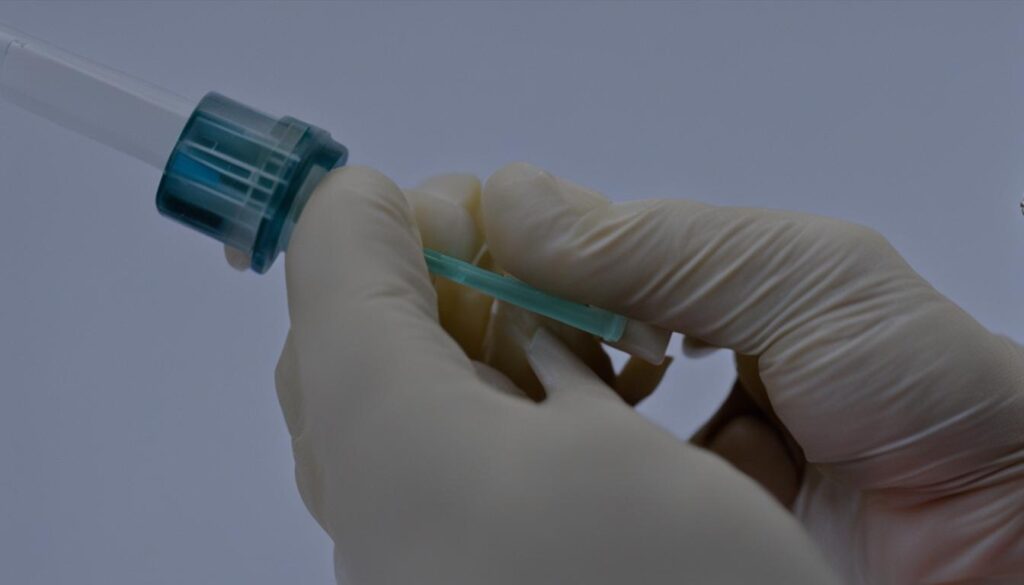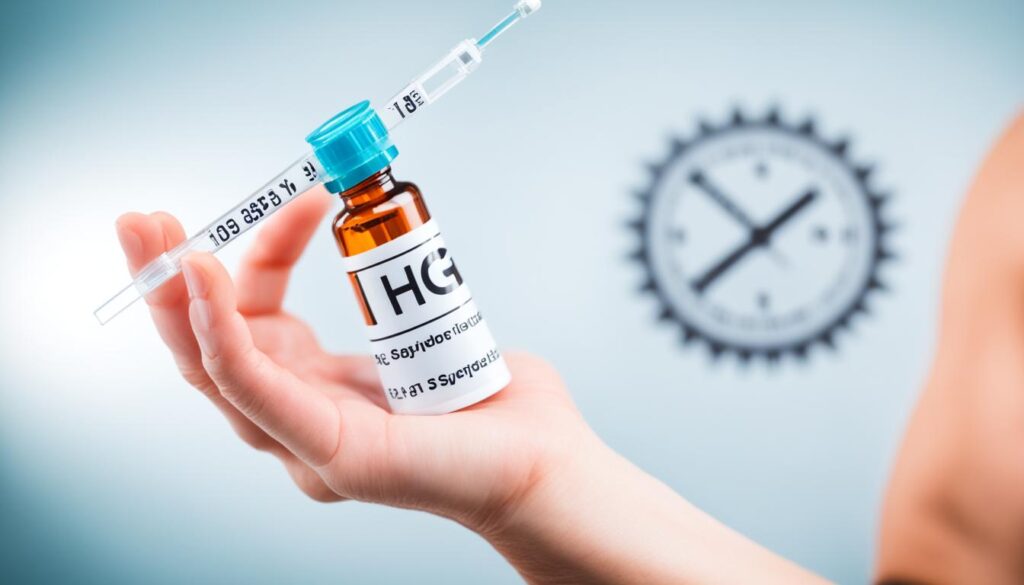Did you know that the use of HCG for weight loss is not only ineffective but can also be potentially dangerous? Despite its popularity as a quick fix for shedding pounds, the U.S. Food and Drug Administration (FDA) has advised against using HCG injections for long-term dieting. This surprising fact highlights the importance of understanding the risks associated with the HCG diet and seeking safer alternatives for sustained weight loss.
Key Takeaways:
- HCG injections for weight loss are not proven to be safe or effective.
- The FDA has advised against the use of HCG for over-the-counter weight loss.
- Severe calorie restriction on the HCG diet can lead to health risks and nutrient deficiencies.
- Safe and sustainable weight loss can be achieved through a balanced diet and regular exercise.
- Consulting a healthcare professional is crucial for developing a personalized weight loss plan.
The History and Mechanism of the HCG Diet
The HCG diet, which has been in existence since the 1950s, is a weight-loss approach that involves a highly restrictive calorie intake, typically ranging from 500 to 800 calories per day. Alongside this low-calorie diet, individuals also receive supplemental HCG injections. The inventor of this diet, British physician Albert Simeons, claimed that HCG enables the body to burn stored fat while preserving muscle mass. However, scientific evidence to support these assertions is lacking, and the Food and Drug Administration (FDA) does not endorse the use of HCG for weight loss. HCG is a hormone produced during pregnancy and is primarily prescribed for fertility-related medical conditions. On the HCG diet, individuals are advised to consume lean proteins, certain low-carbohydrate vegetables, limited fruits, and calorie-free beverages.
Albert Simeons, the proponent of the HCG diet, claimed that HCG injections allow the body to tap into stored fat for energy while preserving muscle mass. However, there is no scientific evidence to support these claims, and the FDA does not approve the use of HCG for weight loss.
| Foods Allowed on the HCG Diet | Foods to Avoid on the HCG Diet |
|---|---|
|
|
The Risks and Dangers of the HCG Diet

The HCG diet is considered unsafe and potentially dangerous. The severe calorie restriction can lead to nutrient deficiencies and other health risks, such as gallstone formation, electrolyte imbalances, and an irregular heartbeat. The HCG injections themselves carry the risk of side effects, including pain, bruising, infection at the injection sites, and allergic reactions.
“Severe calorie restriction can lead to nutrient deficiencies and other health risks.”
It is important to note that the FDA has reported serious adverse reactions to HCG products. These include cases of pulmonary embolism, depression, cerebrovascular issues, cardiac arrest, and even death. This highlights the potential dangers associated with the use of HCG injections for weight loss.
“The FDA has reported serious adverse reactions to HCG products, including cases of pulmonary embolism, depression, cerebrovascular issues, cardiac arrest, and even death.”
Long-term weight loss cannot be achieved through the HCG diet alone. Sustainable weight loss should be pursued through healthier methods recommended by healthcare professionals, such as eating a balanced diet and regular exercise. It is crucial to prioritize safety and consult with a healthcare professional before considering HCG injections or any other extreme weight-loss measures.
“Long-term weight loss cannot be achieved through the HCG diet alone.”
The Dangers of Severe Calorie Restriction
Severe calorie restriction, as required by the HCG diet, can have detrimental effects on the body. It deprives the body of essential nutrients, leading to potential nutrient deficiencies and imbalances. This inadequate intake of calories can also negatively impact metabolism and overall energy levels.
| Risks of HCG Injections | Potential Side Effects |
|---|---|
| Gallstone Formation | Pain, bruising, infection at injection sites |
| Electrolyte Imbalances | Allergic reactions |
| Irregular Heartbeat | – |
“Severe calorie restriction can have detrimental effects on the body, leading to potential nutrient deficiencies, imbalances, and negatively impacting metabolism and energy levels.”
It is crucial to prioritize our health and well-being when considering weight loss options. Opting for safer methods, such as a well-balanced diet and regular exercise, can promote sustainable weight loss and overall wellness. Always consult with a healthcare professional for personalized advice and guidance.
Lack of Scientific Evidence for the HCG Diet
Scientific studies have consistently failed to provide evidence supporting the efficacy or safety of the HCG diet. A 2016 article published in the Journal of Dietary Supplements concluded that there is no scientific basis to support the use of the HCG diet and emphasized the potential harm it can cause. Moreover, the extreme calorie restriction of the diet can lead to nutrient deficiencies and increase the risk of developing serious diseases, such as cancer, diabetes, and heart disease. These findings were further validated by a 2022 study published in the Journal of Preventive Medicine and Hygiene, which stressed the importance of implementing preventive measures to protect individuals on very low-calorie diets from the risks associated with nutrient deficiencies.
The lack of scientific evidence supporting the HCG diet raises significant concerns about its safety and effectiveness. Without proper scientific validation, it is difficult to confidently promote the HCG diet as a viable long-term solution for weight loss.
Considering the potential risks and the absence of scientific backing, individuals seeking sustainable weight loss should explore alternative approaches that prioritize nutrition, exercise, and a well-rounded lifestyle. It is crucial to consult with healthcare professionals and registered dietitians who can provide evidence-based guidance and develop personalized weight loss plans tailored to individual needs and preferences.
The Similarities to Intermittent Fasting
The HCG diet can be seen as similar to a fasting-style diet due to its reduction in calories and minimal eating windows. However, it is important to note that the HCG diet is not based on the principles of intermittent fasting. While both approaches involve calorie restriction, there are significant differences in terms of methodology and potential effects on the body.
“The HCG diet and intermittent fasting may both involve calorie restriction, but they differ in methodology and potential effects on the body.”
In a 2022 study published in the journal of Eating and Weight Disorders, researchers found that individuals who followed low-carbohydrate diets alongside intermittent fasting experienced negative effects such as increased food preoccupation, binge eating, and restrictive tendencies. This suggests that combining specific dietary restrictions with fasting may have unintended consequences and pose potential risks to overall health.
Additionally, a 2017 article published in the journal of Perspectives on Psychological Science highlighted the unfavorable impact of calorie reduction on metabolism and hormones. The body’s response to prolonged calorie restriction can lead to metabolic adaptations that hinder long-term weight loss and promote weight regain. This further emphasizes the need for more research on sustainable weight loss methods beyond simply restricting calories.
Best Practices for HCG Injection Safety
While the HCG diet may have similarities to intermittent fasting, it is crucial to prioritize safety when using HCG injections for weight loss. Here are some best practices:
- Consult a healthcare professional: Before starting any weight loss regimen, including the HCG diet, it is essential to consult with a healthcare professional. They can provide guidance, monitor your progress, and address any concerns or potential risks.
- Follow the prescribed dosage: If you have been prescribed HCG injections, it is crucial to adhere to the recommended dosage provided by your healthcare professional. Deviating from the prescribed dosage can lead to unforeseen side effects and jeopardize your safety.
- Proper injection technique: Ensure that you are using proper injection techniques to minimize the risk of infection, bruising, or other complications. If you are uncertain about the correct technique, seek guidance from a healthcare professional or a trained medical practitioner.
- Choose reputable sources: When obtaining HCG injections, it is important to choose a reliable and reputable source. Be cautious of purchasing HCG injections from unauthorized sellers, as the quality and safety of the product cannot be guaranteed.
HCG Injection Safety Comparison
| Aspect | HCG Diet Injections | Intermittent Fasting |
|---|---|---|
| Calorie Restriction | Severe calorie restriction (500-800 calories per day) | Varies depending on fasting method (typically eating within a specific time window) |
| Potential Side Effects | Risks associated with severe calorie restriction and HCG injections | Possible negative effects on eating behaviors and metabolic rate |
| Long-term Sustainability | Not a sustainable long-term weight loss solution | May be sustainable if done with appropriate nutrition and lifestyle modifications |
| Scientific Evidence | Limited scientific evidence supporting its efficacy | More scientific research available on various aspects of intermittent fasting |
Expert Recommendations and Alternative Approaches

When it comes to the HCG diet, health care professionals and registered dietitians unanimously agree that it is a dangerous approach that should not be recommended. The risks involved, including nutrient deficiencies, disordered eating behaviors, and the potential for weight regain, far outweigh any short-term weight loss potential.
Instead, it is important to focus on safe and sustainable weight loss methods. Gradual calorie reduction, combined with a balanced diet and regular exercise, is recommended under the guidance of healthcare professionals. By taking this approach, individuals can achieve long-term success in achieving and maintaining a healthy weight.
Consulting with a healthcare professional is crucial in designing a weight loss plan that is tailored to individual needs. They have the expertise to provide personalized guidance and support, taking into account factors such as medical history, dietary preferences, and lifestyle. This ensures a safe and healthy approach to weight loss, minimizing the risks associated with extreme diets like the HCG diet.
Best Practices for HCG Injection Safety
- Only use HCG injections under the supervision of a healthcare professional.
- Familiarize yourself with the proper injection techniques and guidelines provided by your healthcare provider.
- Ensure that the HCG injections are obtained from a reputable source and are properly stored to maintain their effectiveness.
- Follow the recommended dosage and schedule provided by your healthcare professional.
- Monitor for any potential side effects or adverse reactions and report them to your healthcare provider immediately.
- Do not share your HCG injections with others, as they are prescribed specifically for your individual needs.
- Always dispose of used needles and syringes properly to prevent accidental injuries.
By following these best practices for HCG injection safety, individuals can minimize the risks associated with the use of HCG injections for weight loss and ensure a safer approach to their weight loss journey.
It is important to prioritize the guidance and expertise of healthcare professionals when it comes to weight loss. They can provide the necessary support and knowledge to help individuals achieve their goals in a safe and sustainable manner. Relying on evidence-based approaches, personalized plans, and ongoing monitoring can lead to long-term success and improved overall health and well-being.
FDA Warning and Legal Status of HCG Products
The use of HCG diet injections and HCG diet products is associated with significant risks and legal implications. The FDA strongly advises consumers to avoid HCG weight-loss products that are sold in various forms, including oral drops, pellets, and sprays. While these products are often marketed with claims of rapid weight loss and metabolic changes, it is important to note that the FDA has not approved HCG for weight loss or over-the-counter use.
HCG is a prescription drug that is approved by the FDA for specific medical conditions, such as female infertility treatment. The use of HCG for weight loss without medical supervision is illegal and potentially dangerous. The FDA has issued warnings about serious adverse reactions that have been associated with HCG products, including cases of pulmonary embolism, depression, and cardiac arrest.
It is essential to prioritize safety and adhere to legal regulations when considering weight loss methods. Consult with a healthcare professional to explore safer and more effective alternatives to HCG diet injections and products.
Disclaimer: The information provided in this section is for informational purposes only and should not be considered as medical advice. Consult with a healthcare professional for personalized guidance.
| Risks of HCG Products | Legal Implications |
|---|---|
| • Pulmonary embolism | • Illegal use without medical supervision |
| • Depression | • Potential for legal consequences |
| • Cardiac arrest | • Non-approval for weight loss |
The Importance of Safe and Sustainable Weight Loss

When it comes to achieving your weight loss goals, it’s important to prioritize safe and sustainable methods instead of resorting to quick fixes like the HCG diet. Very low-calorie diets, such as the HCG diet, are generally unhealthy and can have detrimental effects on your overall health.
These types of diets often lead to nutrient deficiencies and can even increase the risk of developing other diseases. While they may promise rapid weight loss, the risks far outweigh any short-term benefits.
To achieve long-term success with weight loss, it is recommended to focus on gradual, sustainable changes to your lifestyle. This includes adopting a balanced nutrition plan, practicing portion control, and incorporating regular physical activity into your routine.
By taking a more holistic approach to weight loss, you not only improve your chances of reaching your goals but also promote overall health and well-being. Unlike the HCG diet, which can result in fatigue, irritability, depression, and potential weight regain, safe and sustainable weight loss methods offer a more effective and lasting solution.
When making choices about your weight loss journey, it is essential to prioritize your health and well-being. Instead of exposing yourself to the risks associated with the HCG diet, consider consulting with a healthcare professional who can guide you in creating a personalized plan that supports safe and sustainable weight loss.
Conclusion
The HCG diet is not a safe or effective method for long-term weight loss. The lack of scientific evidence and the risks associated with severe calorie restriction and HCG injections make it a dangerous choice. Health care professionals and registered dietitians recommend pursuing safe and sustainable weight loss through a balanced diet, regular exercise, and personalized guidance. It is essential to consult a healthcare professional for a weight loss plan that promotes overall health and well-being.
FAQ
Is the HCG diet safe for long-term weight loss?
No, the HCG diet is not safe for long-term weight loss. The severe calorie restriction and potential risks associated with HCG injections make it a dangerous choice.
What is the history and mechanism of the HCG diet?
The HCG diet has been around since the 1950s and involves a very low-calorie diet along with supplemental HCG injections. However, there is no scientific evidence to support its effectiveness for weight loss.
What are the risks and dangers of the HCG diet?
The risks of the HCG diet include gallstone formation, irregular heartbeat, nutrient deficiencies, and electrolyte imbalances. HCG injections also carry the risk of side effects such as pain, bruising, infection, and allergic reactions.
Is there scientific evidence to support the HCG diet?
No, there is no scientific evidence to support the efficacy or safety of the HCG diet. The FDA does not approve the use of HCG for weight loss, and studies have found potential risks and no long-term benefits.
Is the HCG diet similar to intermittent fasting?
While both involve calorie reduction, the HCG diet and intermittent fasting are not the same. Studies have shown negative effects of low-carbohydrate diets and intermittent fasting on food preoccupation and restrictive tendencies.
What do experts recommend and what are the alternative approaches to weight loss?
Health care professionals recommend pursuing safe and sustainable weight loss through a balanced diet, regular exercise, and personalized guidance. The HCG diet is not recommended, and other methods should be discussed with a healthcare professional.
What is the FDA warning and legal status of HCG products?
The FDA advises against the use of HCG weight-loss products and has not approved them for over-the-counter use. HCG is only approved as a prescription medication for fertility issues and other medical conditions.
Why is safe and sustainable weight loss important?
Safe and sustainable weight loss is important for overall health and well-being. Quick fixes like the HCG diet are associated with risks and are not effective for long-term weight loss.
What is the conclusion regarding the HCG diet?
The HCG diet is unsafe and potentially dangerous. It lacks scientific evidence, carries risks such as nutrient deficiencies and side effects, and is not approved by the FDA for weight loss. Safe and sustainable weight loss methods should be pursued under professional guidance.




